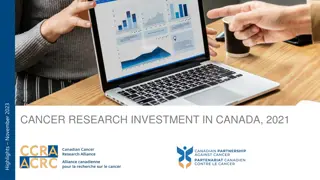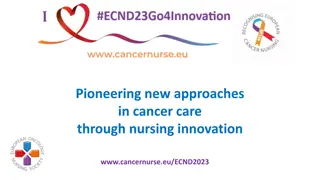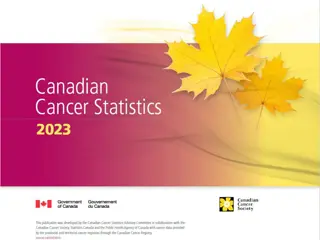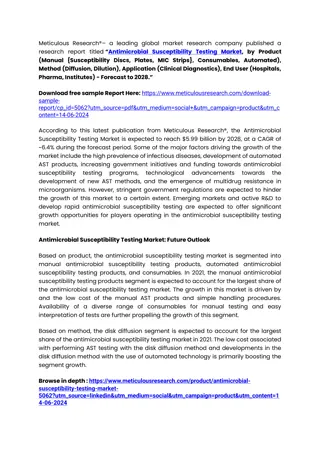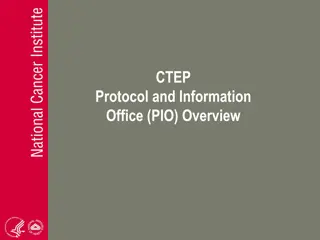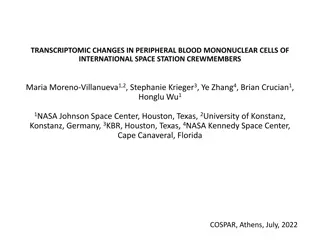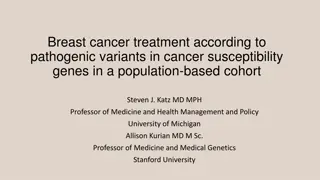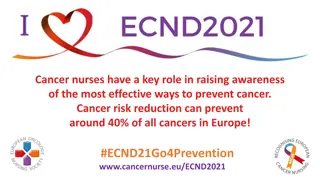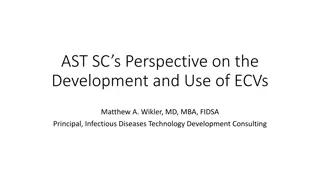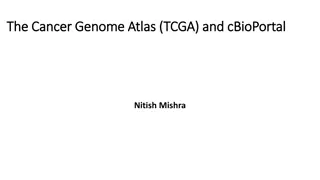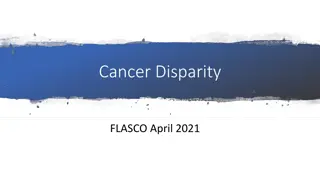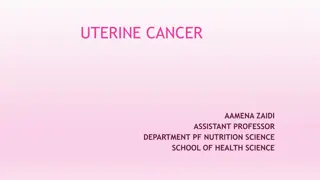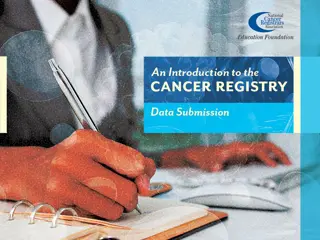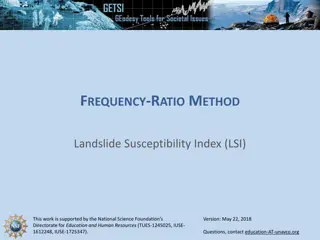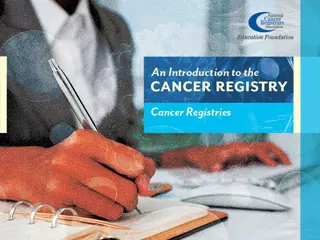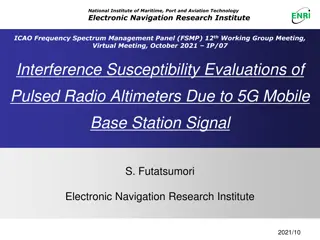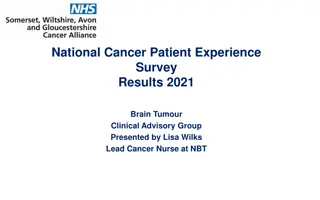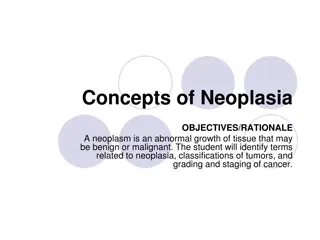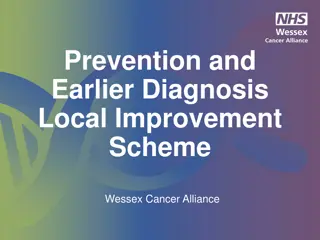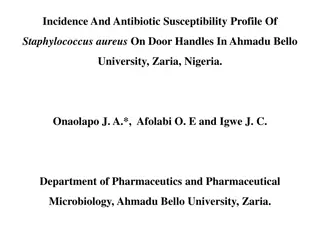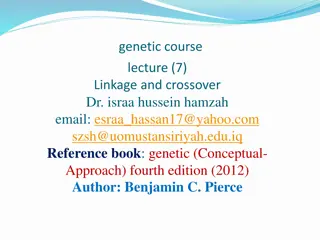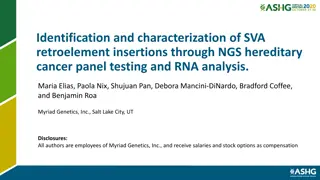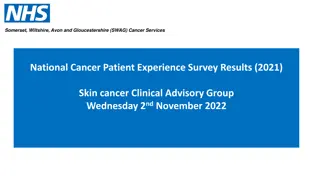What you need to know about the HPV Vaccine
Globally, cervical cancer is the fourth most common cancer in women, with 6,04,000 new cases in 2020. Women living with HIV are 6 times more likely to develop cervical cancer, compared to the general population, and an estimated 5% of all cervical cancer cases are attributable to HIV. The contributi
3 views • 7 slides
Cancer Research Investment in Canada - Highlights November 2023
The Canadian Cancer Research Alliance (CCRA) is a collaboration of organizations funding cancer research in Canada to advance prevention, diagnosis, and treatment. Established in 2005, CCRA has grown to over 35 members and published strategic plans to enhance cancer research outcomes. The Alliance s
2 views • 40 slides
Pioneering new approaches in cancer care through nursing innovation
Pioneering cancer nurses in Europe are driving advancements in cancer care through innovative approaches, evidence-based knowledge, and personalized patient-centered care. They play a vital role in cancer prevention, healthcare policy enhancement, and education improvement. By putting patients and f
0 views • 12 slides
Europe Cancer Diagnostics Market: Emerging Trends in Liquid Biopsy and Next-Gene
The Europe Cancer Diagnostics Market is projected to reach $12.21 billion by 2031, at a CAGR of 5.6% during the forecast period 2024\u20132031. The Europe cancer diagnostics market is driven by the rising prevalence of cancer, supporting initiatives for early cancer diagnosis, increasing investments
3 views • 4 slides
Canadian Cancer Statistics 2023 Overview
The Canadian Cancer Statistics 2023 report provides a comprehensive analysis of cancer data, including trends, statistics, and insights for the year. The report covers various aspects of cancer, such as incidence rates, survival rates, types of cancers diagnosed, and advancements in cancer treatment
0 views • 31 slides
Antimicrobial Susceptibility Testing Market
Government initiatives for combating multidrug resistance are expected to boost the need for antimicrobial susceptibility testing products, thereby driving the growth of the global antimicrobial susceptibility testing market.
1 views • 2 slides
Cancer Therapy Evaluation Program (CTEP) Overview
The Cancer Therapy Evaluation Program (CTEP) aims to enhance cancer patients' lives by advancing cancer treatment through research and clinical trials. The Program includes a Protocol and Information Office (PIO) to streamline trial development processes. It funds national cancer research and focuse
0 views • 27 slides
Unraveling the Mystery of Traits and Genes
Explore the fascinating world of traits and genes, understanding how they are passed down from parent to offspring through chromosomes. Delve into the role of genes in controlling various traits such as hair color, eye color, and even unique characteristics like detached earlobes and widow's peak. D
0 views • 11 slides
Understanding Antibiotic Susceptibility Testing Methods
Antibiotic susceptibility testing is crucial for determining effective antibiotics against bacterial infections. Common methods include Kirby-Bauer and agar disk diffusion, evaluating zones of inhibition to categorize susceptibility. Techniques involve seeding agar plates, placing antibiotic disks,
2 views • 17 slides
Transcriptomic Changes in Peripheral Blood Mononuclear Cells of International Space Station Crew Members
The study analyzed transcriptomic changes in peripheral blood mononuclear cells of International Space Station crew members. Blood samples were collected before and after spaceflight, and differentially expressed genes were identified using RNA-seq analysis. Several genes, including CDKN1A (p21) and
0 views • 12 slides
Breast Cancer Genetic Variants and Treatment Guidelines
Recent research highlights the importance of genetic testing for cancer susceptibility genes in breast cancer patients to guide personalized treatment plans. Guidelines based on pathogenic variants in genes like BRCA1, BRCA2, and others provide insights on relative cancer risks and recommendations f
0 views • 21 slides
Empowering Cancer Prevention Through Nurse-Led Initiatives
Cancer nurses play a crucial role in raising awareness about effective cancer prevention methods, supporting the European Code Against Cancer, providing advice for risk reduction, promoting health literacy, and encouraging early diagnosis through screening programs. Their expertise and leadership ar
0 views • 30 slides
Overview of Epidemiological Cutoff Values (ECVs) in Antimicrobial Susceptibility Testing
Epidemiological Cutoff Values (ECVs) are crucial in determining antimicrobial susceptibility by distinguishing wild-type and non-wild-type microbial populations. ECVs are defined based on factors like minimal inhibitory concentration (MIC) and genetic variation, and are determined through specific m
0 views • 16 slides
Understanding the Cancer Genome Atlas (TCGA) Project
The Cancer Genome Atlas (TCGA) project, initiated in 2005, aims to identify genetic mutations in cancer through genome sequencing. Supervised by the Center for Cancer Genomics, TCGA has expanded over the years, publishing numerous research articles and involving various tumor types. The project has
0 views • 7 slides
Cancer Survival Rates in Europe: Trends and Disparities
Cancer survival rates in Europe have shown variations across different types of cancer and countries. While overall cancer mortality has increased over the years, some countries have experienced declines in mortality rates. Survival rates for breast cancer between 1995-2014 ranged from 74% to 89%, w
0 views • 17 slides
Understanding Cancer Health Disparities and Initiatives
Exploring the concept of cancer health disparities, this content touches on the National Cancer Act of 1971, the impact of social determinants of health, and various initiatives such as the National Minority Cancer Awareness Week. It highlights efforts to reduce disparities through research, advocac
6 views • 8 slides
Understanding Cancer: Causes, Symptoms, and Prevention
Cancer is a disease characterized by the uncontrollable growth and spread of abnormal cells in the body. These cells form tumors that can be either cancerous (malignant) or non-cancerous (benign). Cancer can develop in various parts of the body and is often caused by genetic changes that affect cell
3 views • 21 slides
Understanding Data Submission in Cancer Registry Systems
Data submission in cancer registry systems serves the purpose of contributing to a larger pool of information for monitoring cancer trends, determining patterns, guiding program planning, and assisting public health professionals. Organizations like the State Central Cancer Registries and national p
1 views • 11 slides
Advances in Anticoagulation Therapy for Cancer-Related VTE and Stroke
Recent studies have shown advancements in anticoagulation therapy for cancer patients with venous thromboembolism (VTE) and stroke prevention. Direct oral anticoagulants (DOACs) are now considered beneficial for treating VTE in cancer, offering advantages in administration and efficacy. Different an
3 views • 9 slides
Exploring the Evolution of Molecular Biology: From DNA Discovery to Genome Complexity
Uncover the fascinating journey of molecular biology, tracing key milestones from the discovery of DNA to the intricate structure of genes and genomes. Dive into historical breakthroughs, such as understanding the role of genes in producing proteins, the double helix structure of DNA, and the comple
2 views • 30 slides
Humber, Coast and Vale Cancer Alliance - Cancer Champions Programme Overview
The Humber, Coast and Vale Cancer Alliance's Cancer Champions Programme, led by Trish Rawnsley, aims to raise awareness and promote early diagnosis of cancer. Developed in North East Lincolnshire in 2011, the program has trained almost 1,000 individuals, resulting in lower emergency presentations in
0 views • 10 slides
Understanding Landslide Susceptibility Using Frequency-Ratio Method
This informative content delves into the Frequency-Ratio Method for Landslide Susceptibility Index (LSI), supported by the National Science Foundation. It explains how Frequency-Ratio (FR) methods are used for analyzing landslide susceptibility, the mathematical calculations involved in determining
0 views • 15 slides
Understanding Cancer Registries and Their Significance
Cancer registries serve as vital information systems for collecting, storing, and analyzing cancer data to aid in research, prevention, treatment, and public health efforts. They help track cancer incidence, assist in identifying trends, and provide essential information to healthcare professionals
0 views • 18 slides
Patient Mobility and Cancer: Role of Joint Actions in European Cancer Care
Activities focusing on standardizing cancer care in Europe include quality assurance of screening programs, defining survivorship, establishing Comprehensive Cancer Control Networks, addressing socio-economic inequalities, and promoting public health genomics. The European Cancer Patient Coalition e
0 views • 7 slides
Interference Susceptibility Evaluations of Pulsed Radio Altimeters Due to 5G Signal
This document presents the results of interference susceptibility testing of two pulsed radio altimeters in the presence of 5G mobile base station signals. The test parameters, setup, and results are detailed, including in-band and out-band interference evaluations. The objective is to assess the re
0 views • 16 slides
National Cancer Patient Experience Survey 2021 Results Overview
National Cancer Patient Experience Survey (NCPES) for 2021 focused on brain tumour patients and was led by Lisa Wilks, the Lead Cancer Nurse at NBT. The survey, commissioned by NHS England, aimed to monitor cancer care progress, drive quality improvements, and inform stakeholders. Methodology includ
0 views • 26 slides
Alcohol and Cancer Risk: Understanding the Links
Alcohol consumption is linked to an increased risk of various cancers, including mouth, throat, esophagus, breast, liver, and colorectal cancers. Factors such as ethanol, acetaldehyde, nutrient absorption, estrogen levels, and liver cirrhosis play a role in this risk. Even light drinking can elevate
0 views • 17 slides
Debunking Common Myths About Cancer and Nutrition
The journey of cancer diagnosis brings forth various challenges, including misconceptions about nutrition. Debunking myths like soy stimulating cancer cells, sugar feeding cancer, and acidic diets curing cancer is crucial for informed decision-making. Evidence shows that soy can be a part of a healt
1 views • 11 slides
Understanding Neoplasia and Cancer: Key Concepts and Biological Aspects
Neoplasia encompasses abnormal tissue growth that can be benign or malignant. This article explores neoplastic terms, tumor classifications, cancer staging, and genetic factors in cancer development. Gain insights into the characteristics of benign tumors, the biology of cancer including carcinogene
0 views • 29 slides
Cancer Rehabilitation and Transformation Project Overview
Lead by Catherine Neck, the Macmillan Cancer Rehabilitation/Recovery Package Project aims to enhance cancer care services. The Cancer Transformation Funding supports initiatives for breast, colorectal, and prostate cancers, including holistic needs assessments and wellbeing events. The SWAG Cancer A
0 views • 7 slides
Wessex Cancer Alliance Local Improvement Scheme for Cancer Prevention and Early Diagnosis
This scheme by Wessex Cancer Alliance focuses on improving prevention and early diagnosis of cancer at the local level, with funding allocated on a per-patient basis. Requirements include appointing clinical and non-clinical cancer champions, completing reporting tasks, and participating in webinars
0 views • 6 slides
Global Cancer Statistics and Trends
The data presented showcases global cancer statistics from various years, highlighting the prevalence of different types of cancer across genders. It includes information on the estimated number of cancer cases, common types of cancers, and trends expected up to 2035. Lung cancer, breast cancer, and
0 views • 83 slides
Integration of Complementary Medicine in Cancer Care in Tuscany
Describes the successful integration of Complementary Medicine in the network of Cancer Departments within the Tuscan Public Healthcare System. The initiative, spearheaded by experts in both Complementary Medicine and medical oncology, has led to the development of Regional Guidelines incorporating
0 views • 4 slides
Incidence and Antibiotic Susceptibility of Staphylococcus aureus on Door Handles in Ahmadu Bello University
Environmental microorganisms, like Staphylococcus aureus, play a significant role in morbidity and mortality. This study explores the incidence and antibiotic susceptibility profile of Staphylococcus aureus isolated from door handles in Ahmadu Bello University, Zaria, Nigeria. The research aims to a
0 views • 22 slides
Understanding Cancer Survival Statistics in England
Cancer survival statistics in England, analyzed in collaboration between Public Health England (PHE) and the Office for National Statistics (ONS), provide crucial insights into the effectiveness of cancer services. These statistics measure the mortality rates of cancer patients and inform various st
0 views • 25 slides
Understanding Linkage and Crossover in Genetics
Genes determining individual characteristics are carried in chromosomes, with some genes linked and inherited together. This linkage affects how genes assort in offspring, following principles of inheritance like Mendel's laws. The Chromosome Theory of Linkage explains how the distance between genes
0 views • 24 slides
Cancer Types Spending in Europe
Learn about the spending on various types of cancer in Europe including breast cancer, colorectal cancer, prostate cancer, lung cancer, ovary cancer, and pancreatic cancer. The information is based on the Comparator Report on Cancer in Europe 2019, which covers disease burden, costs, and access to m
2 views • 7 slides
Understanding the Fundamentals of Carcinogenesis and Cancer Hallmarks
Carcinogenesis involves non-lethal genetic damage, clonal expansion of precursor cells, and multi-step processes, with the involvement of normal regulatory genes. The hallmarks of cancer include self-sufficiency in growth signals, insensitivity to inhibitory signals, evasion of cell death, replicati
0 views • 16 slides
Identification and Characterization of SVA Retroelement Insertions in Hereditary Cancer Panels
SVA retroelement insertions, specifically SINE-VNTR-ALU (SVA) types, were examined through Next Generation Sequencing (NGS) and RNA analysis in hereditary cancer panel testing. Twelve unique SVA retroelements were identified in genes like APC, BRCA1, CHEK2, and others, with variant interpretations r
0 views • 6 slides
SWAG Cancer Services National Cancer Patient Experience Survey Results 2021 Overview
The SWAG Cancer Services National Cancer Patient Experience Survey Results for 2021 provide insights into the experiences of skin cancer patients in Somerset, Wiltshire, Avon, and Gloucestershire. The survey, commissioned by NHS England, aims to monitor progress in cancer care, drive local quality i
0 views • 27 slides

